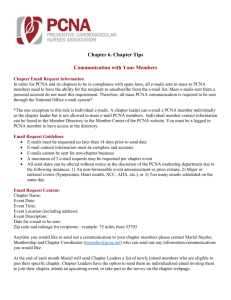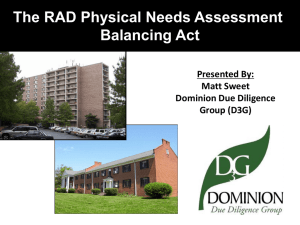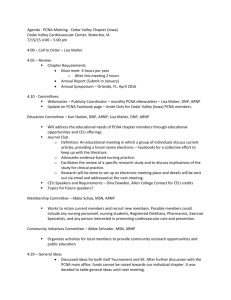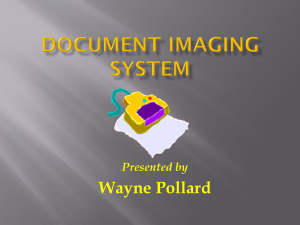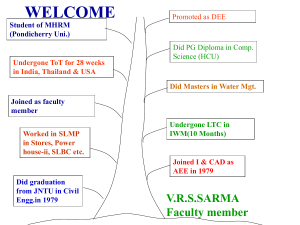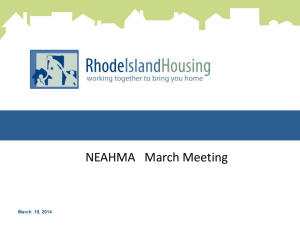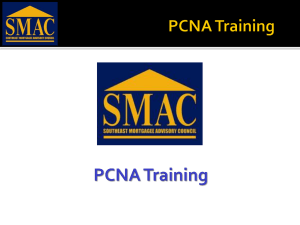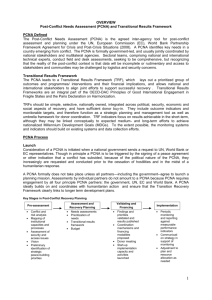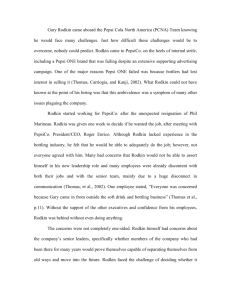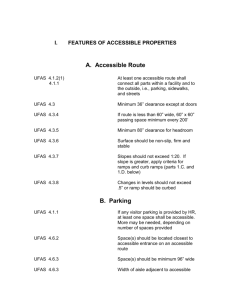PCNA Update - smaconline.net
advertisement
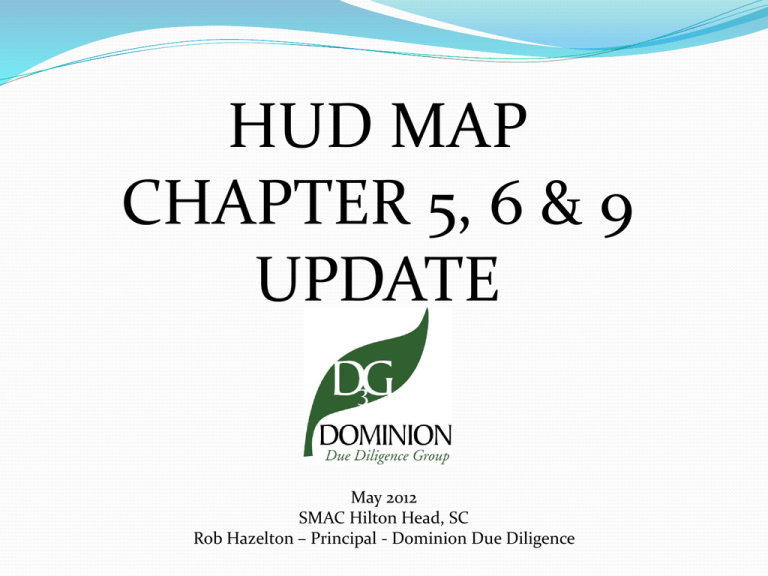
HUD MAP CHAPTER 5, 6 & 9 UPDATE May 2012 SMAC Hilton Head, SC Rob Hazelton – Principal - Dominion Due Diligence PENDING PCNA ML • Emphasizes Consistency • Aims to Improve PCNA Quality • Connects Asset Management with the PCNA • Facilitates Improved HUD Staff Review Time • A Step in HUD’s Commitment to Execution PROPOSED PCNA ML (page 1 of 3) • All Programs - Single Scope of Work with 20-Year R4R • ASTM Standard E2018-10 is being adopted • Broad allowance for upgrades and modernizations • Clarifies Capital Expense vs. Maintenance Expense • 6 month (180 day) shelf-life PROPOSED ML (page 2 of 3) • Potentially shortening loan examinations of >30 year sites term without forensic • Minimum PUPA $250/unit • Only PCNA Enumerated Repairs and Replacements may be drawn from escrow • Crackdown on Accessibility Review, level of requried due diligence and clarification of term “Adaptable” PROPOSED PCNA ML (page 3 of 3) • Accessibility conditions must be Critical Repairs • “Corrective Action Plan” for accessibility-related repairs to defer them from Critical timing • No R4R expenses for first 2 years (except routine item) • Minimum R4R Balance = 5% of the 20-year total for 105% funding at end of 20-year term. ACCESSIBILITY REPAIRS CRITICAL or NON-CRITICAL ? • • CURRENTLY: Per MAP Guide and FAQs, accessibility repairs are to be defined as either Critical or Non-Critical Repairs based upon the nature of the violation and exigent threat to health and safety. PROPOSED: a. ALL accessibility repairs are Critical Repair by FHEO definition. b. Can be deferred to 12-months with a “Corrective Action Plan” c. May be deferred longer with HQ involvement/waiver (few exceptions) IS 30-YEARS OVER THE HILL? Why HUD’s recent cautiousness to the 30+ year old? Many Estimate Useful Life (EUL) values for large multifamily systems expire between 30 and 50-years Risk mitigation notion that a 30+ year old property warrants a shorter loan term (issues of remaining economic life) Accessibility compliance (UFAS) issues Many of these older properties have large cashouts HUD’S New “Early Warning System” of PCNA review MULTIFAMILY FORENSIC ENGINEERING STUDY Pre-Inspection Conference Call is a necessity Obtain, coordinate and/or review applicable forensic & intrusive studies of questionable or aged systems Site inspection requests: Clarify areas of inspection & availability of service providers and staff Determine UFAS applicability (resident profile) Coordinate findings within PCNA report and R4R tables PLUMBING SCOPING PLUMBING PIPE CORROSION INFRARED STUDIES BUILDING ENVELOPE STUDIES However, remember when doing needs assessments of the 30+ year old properties, that one-size does not fit all. One scope of forensic studies is not the same for all properties. The forensic/intrusive inspection needs of a wood-framed 2story garden style apartment complex, and a 10-story masonry apartment building are likely to be drastically different. 1. MAP 5.28 STREAMLINED PROCESSING HUD’S FOCUS ON AFFORDABLE HOUSING 2. LIHTC TAX CREDIT PILOT 3. RENTAL ASSISTANCE DEMONSTRATION LIHTC Streamlined Process (MAP Guide 5.28) Guidance to Defer Submission of Final Architectural Plans and Specifications o ~ 80% set of construction documents o Outline specification only o Costs within 95% accuracy o 2-Stage 3rd Party AEC Reporting Concerns o Time commitment from 80% to 100% o Loose designs cause $$ swings o VE issues / Changes in Design or Amenities The “80% Complete Set” Architectural, Civil documents (at minimum) Project Manual (ML 2010-41 CSI MasterFormat) Geotechnical report ALTA Survey Architectural plans must include: o o o o o All building type plans All unit type enlarged plans Plans for amenity structures Map Appendix 5E Disallowed: “Or equal(s)” and “Allowances” HUD Form 2328 How to fill out the HUD Form 2328 (exp. 01/31/2013) Complete all information on the form Provide a short description for EACH trade item. The “Trade Description” column must be completed Ensure structure cost only above line item 32, with all civil land improvement costs in lines 35 trough 40 Ancillary structure costs only in line item 33 Whole dollar amounts only Soft Cost (Fee) Structure: General Requirements: 3% - 8%. Breakdown required for >8% Builders Overhead: 2% Statutory Limit Builders Profit: 3% to 8%, depending upon size and complexity Performance Bond: >1% TAX CREDIT PILOT PROGRAM THE HEAVY F The new Tax Credit Pilot program allows the following types of transactions to occur, both of which require a version of a PCNA: Section 223(f) acquisition and/or refinance and moderate rehabilitation of affordable properties, with rehabilitation levels up to $40,000 per unit in hard costs. Extension of the 3-year waiver rule for LIHTC properties, allowing for Section 223(f) permanent financing of newly constructed or substantially rehabilitated affordable projects that are complete and stabilized. HEAVY 223-F: COST RECOMMENDATIONS Repairs must be DETAILED Quantity Survey Cost Estimates, also known as line- item/quantity cost estimates, are necessary. The Tax Credit Pilot Mortgagee Letter and Housing Notice both identify the “repair work will be subject to monthly inspections and lender control over draws.” Lump sum costs should be avoided. HEAVY 223-F: DESIGN RECOMMENDATIONS Complete Plans and Drawings are not always needed. Specifications are always needed, but could be just AIA A201 and an outline specification. Per MAP Guide 5.28, firm submission can be made with “deferred submittal” of complete drawings. However, at the time of submission the construction documents must be detailed enough to be cost estimated to an accuracy of 2%. Recommend 80%+ complete. Case Study #1 9% LIHTC Sub-Rehab Scope of work included: - - Flatwork/Parking Repairs Site Lighting/Security Upgrades New Siding / Weatherization Roof, Window, Door Replacement K & B replacements (50% of units) HVAC and DHW Replacement Electric Panel Replacement Interior Finish Replacement Architectural Submission - - Outline/Narrative Specification Interior Unit Matrix Site Plan (sketched w/repairs) 1 Drawings for ADA ramp at CH Case Study #2 4% LIHTC Moderate Rehab Scope of work included: - - Flatwork/Parking Repairs Brick façade repair / Weatherization Roof Replacement Common hall upgrades K & B replacements (55% of units) UFAS Upgrades to 8 units Elevator Upgrades Central Boiler Replacement Architectural Submission - - Outline/Narrative Specification Interior Unit Matrix UFAS Unit drawings (8.5”x11”) Site Plan (sketched w/noted repairs) PIH NOTICE 2012-18 RENTAL ASSISTANCE DEMO Initial Authorization for conversion of 58,750 assisted public housing units Supports leveraging with mortgage insurance/LIHTC equity to facilitate much needed repairs Competitive application process begins August 1st Application Attachment 1B: Financing Letter of Intent Sizing of capital needs per the HUD-OAHP Mark-to-Market program, Green Initiative Scope of Work 2011-2012 NEW HUD TOPICS • National Loan Committee and Hub Loan Committee • Asset Management Involvement in all deals • “Cashout” - The new dirty word? • Breaking Ground and the “Early Warning Process” • Green PCNA Scope of Work (RAD, others?) • New MAP Guide, with revised ESA guideance ASBESTOS New MAP Guide requires an asbestos survey pursuant to “ASTM E2356-10 Standard Practice for Comprehensive Building Asbestos Surveys” ASTM methodologies require: Licensed inspector be used (whether or not sampling performed). If no sampling, all must be PACM. NOB and Trace material analysis by different method. Screening inspection not compliant, unless presumptions made. NEPA DISCUSSIONS SHPO on refinance transactions Noise Studies on 223(f) projects Beware of “Floodways” Executive Order 11880 and 11990 Railroad concerns with LEAN Other Recent Issues? REMEDIATION PLANS Complete removal of contamination Remediation to de minimis levels Meet non site-specific LSTF authority standards No active or passive remediation remaining No need for Eng./Institutional Controls/Monitoring Wells Incomplete removal of contamination Justification for incomplete removal of contamination must be submitted along with the remediation plan, including documentation that: the cost of the incomplete removal of contamination, including any life cycle costs for O&M, and the cost of any enforcement requirements of LSTF authorities, are sufficiently below the costs of complete contamination removal. VAPOR ENCROACHMENT HUD’s Vapor Intrusion Screening Requirement The Phase I ESA must include an initial vapor (soil gas) intrusion screen. Must be performed using Tier 1 “non-invasive” screening pursuant to ASTM E 2600 - 10, as amended. Purpose: To determine if there is a potential for subsurface vapors from volatile organic compounds (VOC), semi-volatile SVOC) and inorganic volatile compounds to occur below existing/proposed structures. Vapors. If the Tier 1 Vapor Screen resulted in an REC then the Phase II ESA shall include either : a Tier 2 Screen pursuant to ASTM E 2600, a Tier 3 Vapor Intrusion Assessment (VIA) as discussed in ASTM E 2600, or go directly to Tier 4 “mitigation”

